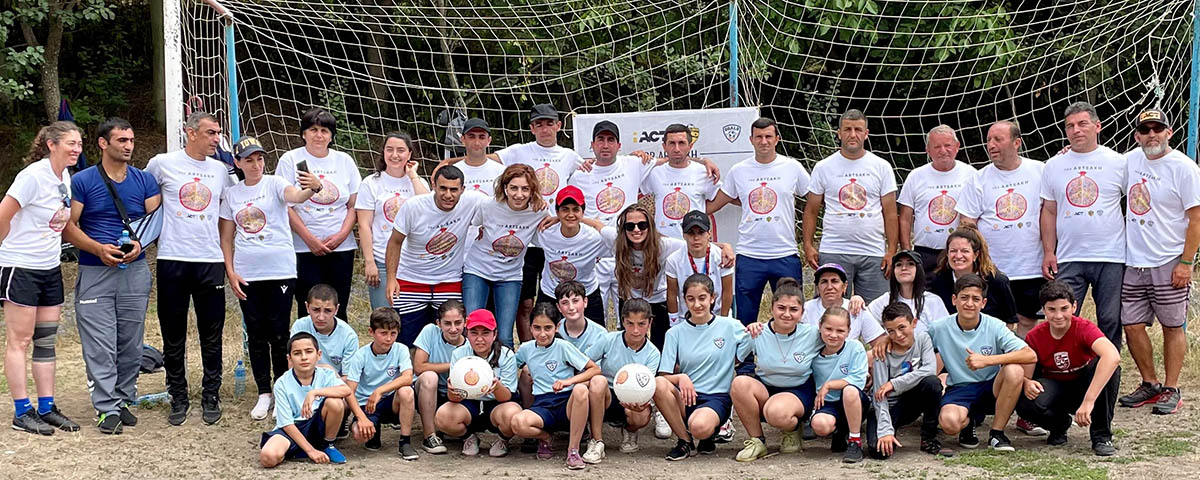We are deeply saddened by the loss of extraordinary humanitarians, Aurora Expert Panel Member and Aurora Community Member Gabriel Stauring and his wife Katie-Jay Scott. Together, they ran the iACT non-profit organization. To honor Gabriel’s and Katie-Jay’s memory, we commit to supporting their mission in Artsakh for one additional cycle, helping Girls of Armenia Leadership Soccer (GOALS) to establish GOALS Academies powered by iACT’s Refugees United Soccer Academy. Below is our last interview with Gabriel Stauring published in September 2021.
Gabriel Stauring was a member of the Aurora Community and Founder and Chief of Vision and Strategy of iACT, a non-profit organization that utilizes innovative thinking and develops collaborative relationships to co-create replicable and cost-effective programs in refugee camps. Today, the organization is also using its expertise to help the people from Artsakh affected by the 2020 war. We talked to Mr. Stauring about iACT’s approach to humanitarian aid that includes working closely with communities to help the refugees keep their dignity.
– Your organization has achieved some impressive results. What are your main operating principles?
Big picture, iACT's mission is to inspire a more mindful humanitarian world where the dignity, humanity, and agency of conflict-affected people are recognized, affirmed, and supported. We work in communities that have experienced the horrors of war—with people that have been brutally displaced and fled to the Chad-Sudan border, Cameroon, Tanzania, the Central African Republic, and Greece. We are currently in Armenia to work with communities affected by the Artsakh war. We support programs that focus on education, sports, leadership development, and human rights.
Smaller picture, we believe the work should be very personal. We enter into relationship with the people from the community. We walk with them and listen. Our programs come in the form of frameworks that then get filled in by the people from the community themselves so that it reflects their cultures and values. The programs become theirs, not ours.

– You personally have been working in the humanitarian field for two decades. What changes and tendencies do you notice now in contrast to when you were just starting out?
The first tragic tendency is that there are exponentially more forcibly displaced people now than when I began working in the humanitarian space, and that number continues to grow alarmingly. According to the UN Refugee Agency, UNHCR, “the number of people fleeing wars, violence, persecution, and human rights violations, rose last year to nearly 82.4 million.”
The UN and traditional non-governmental organizations do heroic work in reaching and providing basic, life-saving aid and services to those most in need. It's never enough, of course, and services tend to be static and impersonal. Twenty years ago, and for decades before that, most refugees would end up in refugee camps that looked like what the average person would imagine — long lines of tents, food distribution lines, and international NGOs doing the work. That is still the case in many places across the world. Over the last decade, though, there was a move to integrate more intentionally the displaced into the host communities and have them access local services that have been supported by the UNHCR and its partner organizations.
One major issue that has remained the same is that people are not fully seen when they enter into the humanitarian space. They are mostly not included in decisions about their own lives or the lives of those in their communities. Thus, after experiencing violence and the loss of home, their dignity and agency are also attacked. But there are also areas where things are starting to look up. New energy and creativity is coming into the space thanks to non-traditional players like the Aurora Humanitarian Initiative and other funders and implementers. This is allowing for new ideas and approaches to be explored and implemented.

– Many people feel overwhelmed by global challenges and reluctantly choose to do nothing because they don’t believe they could make a difference. What would you tell them to inspire them to step up?
It is human nature to feel overwhelmed when confronted with large-scale human suffering. We did not evolve to handle this. We, by nature, care about those around us with whom we feel a personal connection.
I have felt it, being overwhelmed, and I have frozen and done nothing. When I decided to step forward and participate, as I heard about the genocide unfolding in Darfur in 2004, I decided to make it personal. The number of dead and displaced was mind-numbing, so I decided to put a face on the numbers and make it personal. Not everyone has to stop what they are doing and go visit refugee camps. Find a cause you connect with, that you can make personal and contribute to even in the simplest of ways. Allow yourself to be moved emotionally and take that first step. A next step will likely follow.

– Aurora supports modern-day heroes like yourself, highlighting their vital work on the ground. What does being part of this community mean to you and how can others help you as well?
Being a part of the Aurora community, first of all, gives me an invaluable opportunity to learn from the work and the wisdom of others. Aurora also lifts, brings attention to, and supports the work of human rights activists and actors around the world that might not otherwise be noticed. It is humbling and inspiring to be a part of this community.
Anyone anywhere can support our work. Take that first step. Learn a little about a community and individuals affected by conflict. If it moves you, allow it to become personal. You can learn about our work and the people we walk next to at http://iact.ngo. As I mentioned, we are currently in Armenia, close to the Artsakh border, working with local heroes to bring healing and joy to children affected by war.



